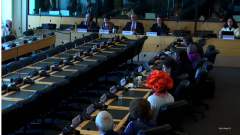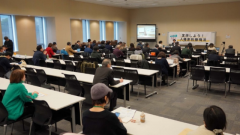UN: CERD adopted urgent actions and follow-up letters at the first online session
October 6, 2020
On the 7th of August, the UN Committee on the Elimination of Racial Discrimination (CERD) concluded its 101st session. The session was held online due to restrictions under the COVID-19 pandemic.
IMADR delivered a joint NGO statement at the opening, highlighting the implication of the pandemic on human rights of those belonging to racialised communities, the role of CERD, and the importance of civil society participation in the Committee’s online procedures during the pandemic.
In accordance with its follow-up procedure, the Committee adopted follow-up letters to Bosnia and Herzegovina, China, Honduras, Japan, Latvia, Mauritania, Mauritius, Norway, Qatar and Saudi Arabia. Read the summary of the follow-up letters on our website.
Under its Early Warning and Urgent Action Procedure, the Committee issued one statement on the pandemic and its implications under the ICERD and another statement on Peru. It also adopted the letters to Belarus, Brazil, Kazakhstan, the Russian Federation and the United States of America.
The Committee made a decision on the admissibility of one individual communication. The Committee adopted amendments to its Rules of Procedure in order to allow virtual work in exceptional circumstances such as the COVID-19 pandemic, and further amendments to the process for urgent actions between sessions. The 2019 annual report was adopted during the 101st session. Video archives of the public meetings can be accessed at UN Web TV.
Early Warning and Urgent Action Procedure
 COVID-19 pandemic and its implications: The Committee adopted a statement concerning the COVID-19 pandemic and its implications under the International Convention on the Elimination of All Forms of Racial Discrimination (ICERD). The statement recognises that marginalised individuals and groups, such as minorities, indigenous peoples, migrants, refugees and asylum-seekers, Roma, non-citizens, people of African descent and those facing discrimination based on descent, are disproportionately affected by the pandemic due to structural racial discrimination. It also highlights intersecting forms of discrimination against women and girls, children, and persons with disabilities who belong to the abovementioned groups.
COVID-19 pandemic and its implications: The Committee adopted a statement concerning the COVID-19 pandemic and its implications under the International Convention on the Elimination of All Forms of Racial Discrimination (ICERD). The statement recognises that marginalised individuals and groups, such as minorities, indigenous peoples, migrants, refugees and asylum-seekers, Roma, non-citizens, people of African descent and those facing discrimination based on descent, are disproportionately affected by the pandemic due to structural racial discrimination. It also highlights intersecting forms of discrimination against women and girls, children, and persons with disabilities who belong to the abovementioned groups.
States’ obligations under the ICERD in addressing the pandemic clarified in the statement include: the prohibition of racial discrimination in their responses to the novel coronavirus; the protection from racial discrimination perpetrated by non-state actors; combatting racist stereotypes, prejudice and stigmatization; ensuring economic, social and cultural rights without discrimination such as the rights to health, housing, education and social security, workers’ rights, the equal access to a vaccine and the participation of vulnerable groups in the design and implementation of emergency measures.
The statement recommends States parties to include following information in their next periodic reports:
(a) The impact of the COVID-19 pandemic on groups and minorities protected under the Convention within their territory and under their jurisdiction;
(b) Measures taken to ensure the participation of all groups and minorities, in particular women, children and persons with disability, in the design and implementation of their response to the COVID-19 pandemic;
(c) Measures taken to protect people belonging to groups and minorities protected under the Convention from the impact of the COVID-19 pandemic;
(d) Measures taken to protect members of vulnerable groups against discriminatory acts and to counter hate speech and stigmatization in connection with the COVID-19 pandemic;
(e) Measures taken to mitigate the socio-economic impact of the COVID-19 pandemic on members of marginalized and vulnerable groups in accordance with their obligation to respect, protect and fulfil economic, social and cultural rights.
 Belarus: The Committee sent a letter to the State party with regard to the complaints of mass arrests, excessive use of force, intimidation and violence against persons belonging to the Roma community, in relation to the investigation of the murder of a police officer in Mogilev Oblast. The Committee expressed concerns about the impartiality and effectiveness of the commission of investigation set up by the Ministry of Internal Affairs due to its composition of the members who were from the same Ministry, which focused on procedural irregularities of the proceeding rather than on the allegations of discrimination against Roma by law enforcement. The Committee found that the outcome of the investigation was limited to disciplinary measures against officers and senior officials. The Committee regretted the absence of information about protection of the victims from any form of retaliation or reprisals for reporting these cases, and on measures to promote dialogue and understanding between Roma and Non-Roma communities.
Belarus: The Committee sent a letter to the State party with regard to the complaints of mass arrests, excessive use of force, intimidation and violence against persons belonging to the Roma community, in relation to the investigation of the murder of a police officer in Mogilev Oblast. The Committee expressed concerns about the impartiality and effectiveness of the commission of investigation set up by the Ministry of Internal Affairs due to its composition of the members who were from the same Ministry, which focused on procedural irregularities of the proceeding rather than on the allegations of discrimination against Roma by law enforcement. The Committee found that the outcome of the investigation was limited to disciplinary measures against officers and senior officials. The Committee regretted the absence of information about protection of the victims from any form of retaliation or reprisals for reporting these cases, and on measures to promote dialogue and understanding between Roma and Non-Roma communities.
 Brazil: The Committee issued a letter to the State party concerning the disproportionate impact of COVID-19 on indigenous peoples, Afro-Brazilians and quilombolas in the country. The Committee was concerned by the information that their human rights such as the rights to health, food, work and education are further undermined by the spread of the novel coronavirus which exacerbates structural discrimination. Multiple forms of discrimination and gender-based violence against women belonging to these communities have also intensified. According to the information, land grabbing and conflicts over indigenous lands as well as related violence have also increased during the COVID-19 crisis. The Committee requested the State party to: adopt measures in consultation with indigenous peoples, Afro-Brazilians and quilombolas to improve their socio-economic situation; provide accessible health care services for these groups; address the specific challenges of women belonging to these groups; and to collect disaggregated data on the impact of COVID-19 on these groups.
Brazil: The Committee issued a letter to the State party concerning the disproportionate impact of COVID-19 on indigenous peoples, Afro-Brazilians and quilombolas in the country. The Committee was concerned by the information that their human rights such as the rights to health, food, work and education are further undermined by the spread of the novel coronavirus which exacerbates structural discrimination. Multiple forms of discrimination and gender-based violence against women belonging to these communities have also intensified. According to the information, land grabbing and conflicts over indigenous lands as well as related violence have also increased during the COVID-19 crisis. The Committee requested the State party to: adopt measures in consultation with indigenous peoples, Afro-Brazilians and quilombolas to improve their socio-economic situation; provide accessible health care services for these groups; address the specific challenges of women belonging to these groups; and to collect disaggregated data on the impact of COVID-19 on these groups.
 Kazakhstan: The Committee sent a letter to the State party about the ethnic-based violence against persons belonging to the Dungan minority committed by non-Dungan persons in the villages of Masanchi, Sortobe, Bular-Batyr, and Aukhatty, Korday District, Jambyl Oblast in the country in February 2020. According to the information received by the Committee, several thousands of Dungan persons were estimated to have fled to the neighbouring country as a result of the violence in which about two hundreds of Dungan persons were injured and their properties were torched. It was reported that the authorities failed to provide effective protection to the Dungan minority, but they committed acts of intimidation and unlawful prosecutions against the minority group and their defendants. Also, unhealthy conditions of detention and a widespread practice of torture were reported to the Committee. It was reported to the Committee that the State party failed to carry out a transparent investigation and allow independent observers. The Committee requested the State party to provide information on: effective, impartial and transparent investigations into the ethnic-based violence; effective protection to the Dungan minority; adequate, effective and prompt reparation to victims; and the access to independent observers.
Kazakhstan: The Committee sent a letter to the State party about the ethnic-based violence against persons belonging to the Dungan minority committed by non-Dungan persons in the villages of Masanchi, Sortobe, Bular-Batyr, and Aukhatty, Korday District, Jambyl Oblast in the country in February 2020. According to the information received by the Committee, several thousands of Dungan persons were estimated to have fled to the neighbouring country as a result of the violence in which about two hundreds of Dungan persons were injured and their properties were torched. It was reported that the authorities failed to provide effective protection to the Dungan minority, but they committed acts of intimidation and unlawful prosecutions against the minority group and their defendants. Also, unhealthy conditions of detention and a widespread practice of torture were reported to the Committee. It was reported to the Committee that the State party failed to carry out a transparent investigation and allow independent observers. The Committee requested the State party to provide information on: effective, impartial and transparent investigations into the ethnic-based violence; effective protection to the Dungan minority; adequate, effective and prompt reparation to victims; and the access to independent observers.
 Peru: The Committee adopted a statement to the State party concerning the situation of indigenous peoples in the COVID-19 pandemic. The Committee expressed concerns on the pandemic’s disproportionate impact on indigenous peoples and the absence of an effective response to protect their rights including the right to land and other natural resources. The Committee urged Peru to ensure the participation of indigenous peoples in decision-making processes in addressing the COVID-19 pandemic, immediately adopt and implement protection measures for indigenous peoples with adequate resources including for their economic, social and cultural rights, ensure the full respect of indigenous territories, ensure the right to free, prior and informed consent and cooperate internationally to coordinate its responses to the pandemic, in particular in the Amazon region.
Peru: The Committee adopted a statement to the State party concerning the situation of indigenous peoples in the COVID-19 pandemic. The Committee expressed concerns on the pandemic’s disproportionate impact on indigenous peoples and the absence of an effective response to protect their rights including the right to land and other natural resources. The Committee urged Peru to ensure the participation of indigenous peoples in decision-making processes in addressing the COVID-19 pandemic, immediately adopt and implement protection measures for indigenous peoples with adequate resources including for their economic, social and cultural rights, ensure the full respect of indigenous territories, ensure the right to free, prior and informed consent and cooperate internationally to coordinate its responses to the pandemic, in particular in the Amazon region.
 Russian Federation: The Committee issued a letter to the State party concerning an inter-ethnic confrontation involving Roma and non-Roma in the village of Chemodanovka, Penza Oblast in June 2019. The Committee was reported that around 900 local Roma persons had to flee while arbitrary detention and inhuman treatment were committed by law enforcement officers. The letter also addressed the anti-Roma pogrom in Ust-Abakan, Republic of Khakassia in May 2019, which resulted in the death of a young Russian man and the fleeing of around 500 Roma people from their village. Roma were reportedly subject to a Court order to demolish around fifteen of their houses, without an alternative option for resettlement. The Committee requested the State party to respond to these allegations by 30th October 2020.
Russian Federation: The Committee issued a letter to the State party concerning an inter-ethnic confrontation involving Roma and non-Roma in the village of Chemodanovka, Penza Oblast in June 2019. The Committee was reported that around 900 local Roma persons had to flee while arbitrary detention and inhuman treatment were committed by law enforcement officers. The letter also addressed the anti-Roma pogrom in Ust-Abakan, Republic of Khakassia in May 2019, which resulted in the death of a young Russian man and the fleeing of around 500 Roma people from their village. Roma were reportedly subject to a Court order to demolish around fifteen of their houses, without an alternative option for resettlement. The Committee requested the State party to respond to these allegations by 30th October 2020.
 USA: The Committee sent a letter to the State party about the situation of Gwich’in indigenous peoples in Alaska. The Committee received the information that the planned oil and gas development in the Coastal Plain of the Arctic National Wildlife Refuge in Alaska was conducted without free, prior and informed consent of and adequate consultation with the indigenous community. The Committee received a concern that the development would have a significant impact on Gwich’in indigenous peoples’ traditional source of food, sacred site, health and environment, and increase the risk of violence against indigenous women. The information the Committee received alerted that the development would exacerbate the disproportionate impact of climate change on indigenous peoples. The Committee requested the State party to provide information on measures to: respect the rights to consultation and to free, prior and informed consent of the Gwich’in indigenous peoples; effectively protect the sacred sites of indigenous peoples; prevent and combat violence against indigenous women; assess and mitigate the plan’s impact on climate change; and ensure effective remedies against instances of racial discrimination.
USA: The Committee sent a letter to the State party about the situation of Gwich’in indigenous peoples in Alaska. The Committee received the information that the planned oil and gas development in the Coastal Plain of the Arctic National Wildlife Refuge in Alaska was conducted without free, prior and informed consent of and adequate consultation with the indigenous community. The Committee received a concern that the development would have a significant impact on Gwich’in indigenous peoples’ traditional source of food, sacred site, health and environment, and increase the risk of violence against indigenous women. The information the Committee received alerted that the development would exacerbate the disproportionate impact of climate change on indigenous peoples. The Committee requested the State party to provide information on measures to: respect the rights to consultation and to free, prior and informed consent of the Gwich’in indigenous peoples; effectively protect the sacred sites of indigenous peoples; prevent and combat violence against indigenous women; assess and mitigate the plan’s impact on climate change; and ensure effective remedies against instances of racial discrimination.





